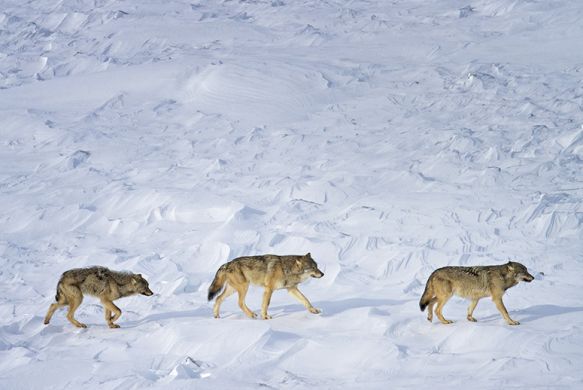Comments Reviews on theboatpeople.com Raft Cataraft Inflatable Kayak Products and Service › Forums › Environmental News › Three Wolves Are Left in Isle Royale National Park
- This topic has 0 replies, 1 voice, and was last updated 10 years, 2 months ago by
 Lee Arbach TBP.
Lee Arbach TBP.
-
AuthorPosts
-
April 28, 2015 at 1:45 am #2436
 Lee Arbach TBPKeymaster
Lee Arbach TBPKeymaster
In 2009, there were 24 wolves left in Michigan’s Isle Royale National Park. By 2013, there were nine.This year, there are only three.
“This is worse than I thought the worst-case scenario for the wolf population would be,” said wildlife ecologist Rolf Peterson, one of two researchers at Michigan Technical University who conducted this year’s field study, in February.
They recorded only three wolves on the island: two adults and one nine-month-old pup, traveling together. The pup did not look healthy, said Peterson, with a hunched back and a curlicue for a tail—most likely the result of third-generation inbreeding.
(Photo courtesy IsleRoyaleWolf.org)
“With every generation the inbreeding is getting worse, and we don’t expect the island’s population to survive now,” Peterson said.
Over 45 years of studying the Isle Royale wolves, Peterson has witnessed the direct effects of climate change on this 206-square-mile island, located about 11 miles from the Canadian side of Lake Superior.
Wolves originally migrated to the island in the 1930s by walking across ice bridges from the mainland. But warmer winter temperatures mean the ice doesn’t form the way it used to, cutting off the wolves of Isle Royale from Canada’s broader wolf population.
This past winter, an ice bridge formed during a particularly cold stretch of days, and two mainland wolves made the crossing to Isle Royale. But they retreated back to the mainland before the bridge melted, reportedly accompanied by two wolves from the island, Peterson said.
Since burning fossil fuels is what has put the Isle Royale wolves in this tight spot, Peterson and a Michigan Tech colleague, associate wildlife ecology professor John Vucetich, have tried for four years to persuade the National Park Service that a human-influenced solution could be the only option for saving the species, along with the island’s ecological health.
The remote island is the site of the longest-running study of the relationship between predator (wolf) and prey (moose). Over the study’s 57 years, moose populations historically rose when the wolf population declined, leading to overgrazing on the island’s balsam trees—the moose’s favorite food.
With the wolves in severe decline, Isle Royale’s moose population jumped from 500 in 2007 to 1,250 this year. “When moose go unchecked, we know pretty well what will happen,” Peterson said. “A big increase in their population, the degradation of their food supply, and a massive die-off.”
In two Canadian parks, officials managed similar ecological imbalances by licensing moose hunts. But Peterson and Vucevich believe that bringing new wolves to Isle Royale would be a better solution, because it would solve two problems at once.
“Drop off a couple wolves that will mate with the current population,” Peterson said, “and it could restart the population,” which in turn would cull the moose.
What One Wolf’s Extraordinary Journey Means for the Future of Wildlife in AmericaBut so far the National Park Service has been reluctant to expand the island’s wolf population. Last spring, the agency issued a statement claiming it would start constructing a “comprehensive planning process that considers management of wolves, moose, and vegetation on the island.” But so far, no plan has emerged. If the island’s last three wolves are not joined by other wolves soon, the question may resolve itself.
Isle Royale park superintendent Phyllis Green was unavailable for comment.
The park’s wolf population is fading even as federal wildlife officials and several Great Lakes states have sought to end federal endangered species protections for their gray wolf populations.
-
This topic was modified 10 years, 2 months ago by
 Lee Arbach TBP.
Lee Arbach TBP.
-
This topic was modified 10 years, 2 months ago by
-
AuthorPosts
- You must be logged in to reply to this topic.
- Click to share on Facebook (Opens in new window) Facebook
- Click to share on X (Opens in new window) X
- Click to share on LinkedIn (Opens in new window) LinkedIn
- Click to share on Pinterest (Opens in new window) Pinterest
- Click to share on Tumblr (Opens in new window) Tumblr
- Click to share on Reddit (Opens in new window) Reddit
- Click to share on Pocket (Opens in new window) Pocket
